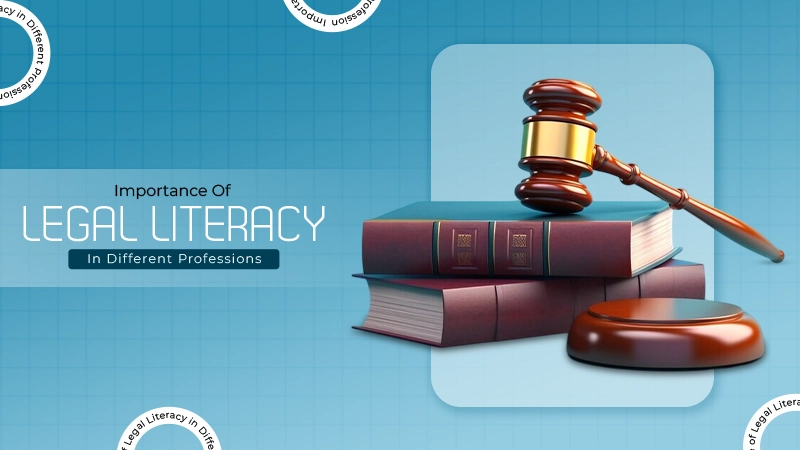
For generations, the complex world of law was relegated to the specialized domain of attorneys and paralegals. Legal knowledge was seen as a contingency, something one sought only when a problem arose. Today, however, that paradigm is collapsing. In an environment characterized by rapid digitalization, unprecedented cross-border activity, and regulatory sprawl, basic legal literacy has transformed from a professional advantage into a fundamental necessity for success in every field.
Legal literacy does not mean knowing how to argue a case in court like a criminal justice lawyer might do; it means possessing the core understanding necessary to identify legal risks, navigate compliance obligations, and make ethically sound decisions before a crisis unfolds. It is the ability to recognize the “red flags” inherent in contracts, employment policy, intellectual property, and data handling.
For the modern professional, whether a software engineer, a marketing executive, or a healthcare administrator, ignorance of the law is no longer a viable defense against liability.
The following are some reasons behind the growing importance of legal literacy in professionalism.
Risk and Responsibility
The urgency of legal literacy is driven primarily by three converging forces: globalization, technological advancement, and the subsequent surge in regulatory scrutiny.
Decades ago, a small business operated primarily within the confines of local jurisdiction. Today, a micro-SME selling goods online may inadvertently breach consumer protection laws in three different countries simultaneously. This connectivity means that liability is instant and expansive.
The consequences of this ignorance are becoming increasingly visible. Fines, while financially painful, are often overshadowed by the lasting harm to professional reputations. A manager who unknowingly violates employment law or a developer who neglects accessibility standards is not merely creating a legal headache for the company; they are fundamentally eroding trust and creating professional liability for themselves.
Legal Literacy in Action
The need for basic legal understanding is universal, but its application manifests differently across professions:
1. Technology and Engineering
Engineers and product managers are the architects of the digital age, yet they often lack formal legal training. Legal literacy in this sector revolves around data privacy, security protocols, and ethical AI development. Every piece of code, every API integration, and every data storage decision carries legal ramifications. An engineer must understand the difference between personally identifiable information (PII) and anonymized data, and how that distinction affects jurisdiction and security requirements. Failure to integrate “privacy by design” into a product’s architecture guarantees costly retrofitting and potential regulatory sanctions down the line.
3. Human Resources and Management
For HR professionals, managers, and operational leaders, foundational legal knowledge is the scaffolding of fair and legal employment practices. Understanding anti-discrimination laws, wage and hour regulations, remote work complications, and proper termination protocols is non-negotiable. A misstep in drafting a performance improvement plan or handling a workplace harassment complaint can quickly escalate into a catastrophic lawsuit. Legal literacy here translates directly into risk mitigation and the fostering of a high-trust, compliant workplace culture.
3.Marketing and Creative Industries
The creative world is built on originality, yet it operates under the strict framework of Intellectual Property (IP) law. Marketing professionals must understand the basics of copyright, trademarks, and licensing to avoid infringing on existing material or, conversely, to robustly protect their own creative assets. Furthermore, they must adhere to truth-in-advertising guidelines (such as those enforced by the FTC), ensuring transparency in endorsements, testimonials, and native advertising. A campaign that looks brilliant creatively can be legally toxic if it fails to accurately disclose commercial relationships.
Beyond Compliance
While avoiding lawsuits through the use of someone with a Juris Doctor degree, is the primary defensive goal of legal literacy, the proactive benefits offer a significant strategic advantage. Legally literate professionals are simply better negotiators and more effective decision-makers.
When an employee understands the contours of a non-disclosure agreement (NDA) or the limits of a licensing contract, they negotiate with confidence. They spend less time relying solely on external counsel, streamlining business processes and reducing friction. This knowledge empowers teams to structure deals creatively, spot opportunities where others see only legal roadblocks, and align business strategy with regulatory reality from the outset.
Cultivating Legal Acumen
The responsibility for enhancing legal literacy falls both on the professional and the organization. Companies must integrate accessible, field-specific legal training into continuous professional development programs, replacing dry manuals with practical, scenario-based learning. Professionals, meanwhile, must commit to continuous self-education, treating legal basics not as auxiliary knowledge, but as a core competency akin to financial modeling or technical proficiency.
In the 21st-century economy, every professional is, by necessity, a steward of their organization’s legal health. The complexity of modern business demands that we move beyond the outdated notion that law is solely the lawyer’s burden.
By embracing legal literacy, individuals’ future-proof their careers, mitigate operational risks, and, most importantly, establish a crucial foundation for ethical and competent leadership.